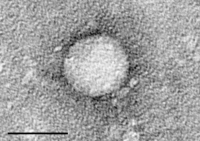
Photo from wikipedia
ETHNOPHARMACOLOGICAL RELEVANCE Weierning tablet (WEN) is a traditional Chinese patent medicine that has been widely used in clinical for chronic atrophic gastritis (CAG)therapy for years. However, the underlying mechanisms of… Click to show full abstract
ETHNOPHARMACOLOGICAL RELEVANCE Weierning tablet (WEN) is a traditional Chinese patent medicine that has been widely used in clinical for chronic atrophic gastritis (CAG)therapy for years. However, the underlying mechanisms of WEN on anti-CAG are still unveiled. AIM OF THE STUDY The present study aimed to elucidate the characteristic function of WEN on anti-CAG and to illuminate its potential mechanism. METHODS The CAG model was established by gavage rats with a modeling solution (consisting of 2% sodium salicylate and 30% alcohol) with irregular diets and free access to 0.1% ammonia solution for two months on end. An enzyme-linked immunosorbent assay was used to measure the serum levels of gastrin, pepsinogen, and inflammatory cytokines. qRT-PCR was applied to measure mRNA expressions of IL-6, IL-18, IL-10, TNF-α, and γ-IFN in gastric tissue. Pathological changes and the ultrastructure of gastric mucosa were examined by hematoxylin and eosin staining and transmission electron microscopy, respectively. AB-PAS staining was applied to observe the intestinal metaplasia of gastric mucosa. Immunohistochemistry and Western blot were used to measure the expression levels of mitochondria apoptosis -related proteins and Hedgehog pathway-related proteins in gastric tissues. Expressions of Cdx2 and Muc2 protein were determined by immunofluorescent staining. RESULTS WEN could dose-dependently lower the serum level of IL-1β and the mRNA expressions of IL-6, IL-8, IL-10, TNF-α, and γ-IFN in gastric tissue. Also, WEN significantly alleviated the collagen deposition in gastric submucosa, regulated the expressions of Bax, Cleaved-caspase9, Bcl2, and Cytochrome c to reduce the apoptosis of gastric mucosa epithelial cells, and maintained the integrity of the gastric mucosal barrier. Moreover, WEN could reduce protein expressions of Cdx2, Muc2, Shh, Gli1, and Smo, and reverse intestinal metaplasia of gastric mucosa to block the progress of CAG. CONCLUSION This study demonstrated a positive effect of WEN on improving CAG and reverse intestinal metaplasia. These functions were related to the suppression of gastric mucosal cells' apoptosis and the inhibition of Hedgehog pathways' activation.
Journal Title: Journal of ethnopharmacology
Year Published: 2023
Link to full text (if available)
Share on Social Media: Sign Up to like & get
recommendations!